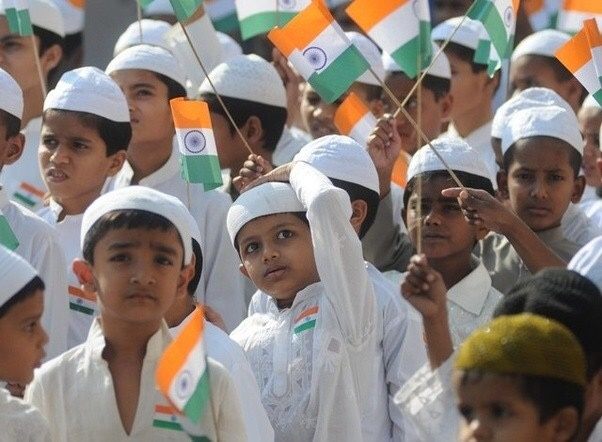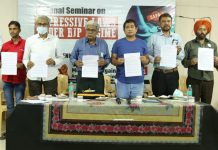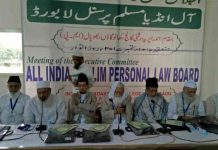By Mohammad Adeeb ex-MP
Editor’s Note: This is in response to Ramchandra Guha’s article in The Indian Express, titled “Liberals, sadly” (March 20)
http://indianexpress.com/article/opinion/columns/liberals-sadly-indias-liberals-must-take-on-both-hindu-and-muslim-communalists-5103729/
—
For Ramchandra Guha, Muslims are represented by the likes of Arif Mohammed Khan, M.C. Chagla and Hamid Dalwai. It reminds me of what the late Raj Narain told me back in the 1970s. He said: “It is not going to be difficult for you to become a powerful political leader overnight.” Upon enquiring about the formula for the same, he replied: “Simply abuse or look down upon your community and religion.” If this is the formula, then what can be said?
But I want to ask Guha what he expects from Indian Muslims; we never accepted Mohammed Ali Jinnah as our leader and for us, Mahatma Gandhi was the leader whose ideology we all looked up to. Unfortunately, he was killed too soon by the RSS bhakts. We never paid heed to Liaquat Ali Khan. Our complete faith was put in Pandit Nehru as prime minister. But in this country now, Nehru is also slowly being removed from the history books and his reputation is being tarnished. It is such a shame that when our prime minister visits the United Nations, he mentions the names of those prime ministers who served for only months but conveniently forgets to mention the prime minister who served for 11 years — a prime minister whose last wish was to make a religiously diverse country into a secular one.
The most important leader from within the minority community in India was Maulana Abul Kalam Azad. He fought with the Muslim League on the one hand and with the RSS on the other. Sadly, the person he fought against from the Muslim League became the Quaid-e-Azam of his country and the other from the RSS wing has now become the ruler of this country. A person who kept fighting the religious forces ultimately was buried at the doorstep of Delhi’s Jama Masjid and with him, his legacy was also buried.
Finally, Muslims got a leader in Dr. Abdul Jaleel Faridi in the 1960s and he launched the Muslim Majlis party. In 1967, he had a very big rally to which he invited Parihaar in order to unite Dalit, backwards, SC, ST and Muslims on a solid platform. Even in Dr. Faridi’s case, however, Muslims gave him just 2 to 3 percent of the votes and his political venture was shortlived.
Then after many years in the 1990s I met the late Kanshi Ram. He told me bluntly that we started DS4 (Dalit Shoshit Samaj Sangharsh Samiti) after the Parihaar and Faridi meeting and now we have the government in our hands. So basically, Muslims wouldn’t accept their own leader and were ready to rally behind another party, based on the same ideology though with another leader.
Another leader was Syed Shahabuddin. Thanks to the media painting him as “Another Jinnah,” he also did not succeed in getting the majority Muslim vote.
Historically Muslims in India, barring a few, have always voted for secular parties — the same “secular” parties, which when they saw that the Muslim vote was becoming a liability for them, conveniently stomped ahead, leaving the minorities behind in limbo.
Do Guha and others still want us to come into the mainstream? Can they kindly tell us what exactly they mean by this?
So where does the “Muslim” go now?
Guha lives in the south. I feel that that may be the reason he is unable to understand the situation the Muslims, especially in the north, find themselves in. Muslims in the north saw the Mutiny (1857) and Partition (1947) at very close quarters. The day India got independence, the entire blame was passed onto the shoulders of the minorities. The fact, on the other hand, is that the blame has been established repeatedly (also clearly by Jaswant Singh in his book) that it was the handiwork of both the parties concerned. As a result, Muslims are a very defensive community and we know that a community which lives in fear does not prosper. They have also seen how the people who migrated from Pakistan have been accepted locally. The truth is that even those who stayed back in India also deserve the same inclusiveness. In fact, it cannot be ignored that if all Muslims had packed their bags and migrated, Pakistan would not have been limited to Lahore but to Lucknow as well.
But the reality is that Indians who stayed behind have yet to be accepted wholeheartedly by the country’s majority. Isn’t it a shame that a community that rallies behind its country with the utmost sincerity is being doubted, questioned, and occasionally even attacked. They have to fight at regular intervals for their identity.
According to the constitution of India, two consenting adults are allowed to marry, regardless of religion. Recently, however, a non-Muslim girl married a Muslim boy and the High Court of this country annulled their marriage. The worst part is that it did not end there — throughout, the boy was targeted on the basis of some ill-founded and cooked-up insinuations of allegiance to ISIS. The point is that even if that were true, the court still had no right to terminate the marriage.
This onslaught on the existence of minorities is even taking a toll on the country’s secular people. They feel that if they speak up, they will also be singled out for bad treatment.
Guha should have questioned the hard-line leadership running the country now. They have re-invented the “Hindu” religion. The religion which was once known for tolerance has been re-branded as one that is communal and is engulfed in inferiority complexes. The leadership is determined to highlight and rejoice in incidents in which Rana Pratap was victorious and Akbar was defeated. Very soon these historians will give Rani Jhansi more credit than Queen Victoria!
They are trying to inflame passions and if such learned people take such stands, then it makes me feel that my stand of political abstinence is correct. I request Guha to take an assessment of the minorities again and gauge for himself where their loyalties lie. It is a shame when our vision gets limited to the way of dressing of a section of our community. If someone wants to wear the “burqa”/veil, then that should be a personal choice based on their convictions. It should not be by compulsion but if it is by choice, then it should be respected. That is the kind of freedom guaranteed to every citizen. As the saying goes, “Don’t judge a book by its cover” and equally, don’t judge someone by his or her dress.
Don’t forget that the two big leaders of Indian history — Gandhiji and Maulana Azad — were both very religious. Gandhiji was a hard-core Hindu who started his day with prayers that lasted about an hour and whose last words were “Hey Ram.” Yet India has yet to find a more secular leader than he was. And Maulana Azad, if not in politics, would have been known worldwide as a Muslim scholar.
Being religious along with being a secular patriot is not only a possibility but rather a paradox that forms the basis of our Indian history. We don’t need to choose one, but need instead to try to be both!One hopes that one day the Indian Muslims will find another Gandhiji, one who is not limited to election manifestos. ( Siyasat.Net News Desk )



































I do not agree with Mohammad Adeeb ex-MP. he has tried to defend indefensible. Maulana Azad was not acceptable to Muslims. Hindus have accepted him because this fake Maulana had endorsed the Hindu line. He readily signed what his Hindu masters made him to sign. He was cheating the Muslims by his Muslim name, Muslim dress. Even within the Congress he was not acceptable.
We have Prophet Mohammed ( PBUH) whose teachings are useful to not only Muslims but to entire mankind till the day of judgement. Muslims do not need Mohammad Adeeb, Maulana Azad, Gandhi and so on so fourth as their leaders. Mr. Adeeb has also taken pro upper caste Hindu line which should be condemned in the strongest possible terms.
Comments are closed.